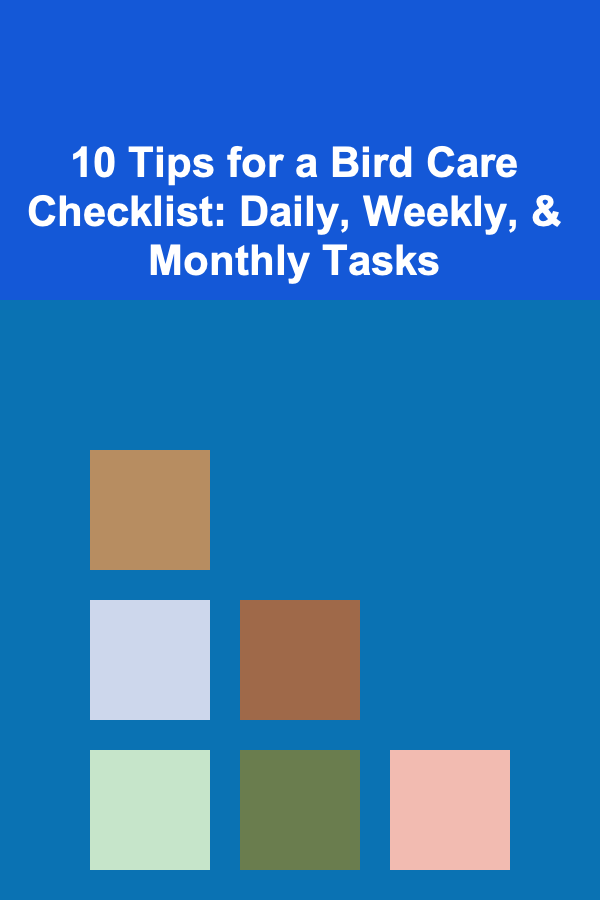
10 Tips for a Bird Care Checklist: Daily, Weekly, & Monthly Tasks
ebook include PDF & Audio bundle (Micro Guide)
$12.99$6.99
Limited Time Offer! Order within the next:

Birds make wonderful pets, but they require a lot of care and attention to stay healthy and happy. Whether you're a first-time bird owner or an experienced enthusiast, understanding the right care routine is essential to ensuring your feathered friend lives a long, fulfilling life. This article will provide you with a comprehensive bird care checklist, breaking down the necessary tasks into daily, weekly, and monthly routines. Each of these tasks contributes to the overall well-being of your bird, from proper nutrition and hygiene to mental stimulation and socialization.
Daily Bird Care Tasks
1. Feeding and Fresh Water
One of the most essential parts of bird care is ensuring that your bird has access to fresh food and clean water every day. Birds can be picky eaters, so it's important to provide them with a balanced diet that includes a variety of fresh fruits, vegetables, seeds, and pellets, depending on their species. You should also:
- Remove any leftover food from the cage at the end of the day to prevent spoilage.
- Replace water daily to keep it fresh and free of contaminants.
- Offer fresh greens or fruits for added vitamins.
2. Cleaning the Cage
Cleaning the bird's cage is essential to maintaining a hygienic living environment. A dirty cage can lead to health issues like respiratory infections, parasites, and feather problems. Key daily tasks include:
- Sweep up any dropped seeds or feathers around the cage.
- Wipe down perches and toys to remove any waste or droppings.
- Spot clean any areas with visible messes or leftover food.
- Check for any droppings that are stuck to surfaces---they can sometimes harden and be difficult to remove later.
3. Exercise and Mental Stimulation
Birds are highly intelligent creatures that need daily exercise and mental stimulation to stay happy and healthy. Provide your bird with plenty of opportunities to fly, explore, and play. You can:
- Let your bird out of the cage for supervised flight time, if possible. This allows your bird to stretch its wings and burn off energy.
- Introduce new toys or rotate toys regularly to prevent boredom.
- Provide foraging opportunities by hiding treats or food in different parts of the cage or in puzzle toys.
4. Check Health and Behavior
Observe your bird's behavior daily to spot any signs of illness or discomfort early. Healthy birds are typically active, alert, and have bright eyes. Signs that your bird might not be feeling well include:
- Fluffed-up feathers
- Lethargy or lack of interest in food and water
- Changes in droppings (watery, excessively dark, or discolored)
- Breathing problems or excessive sneezing
If you notice any of these signs, it's essential to consult an avian vet as soon as possible.
5. Grooming
Most birds naturally groom themselves, but you should still check that your bird's feathers and nails are in good condition. Light grooming can be part of the daily routine:
- Check feathers to make sure they are clean and free from mites or debris.
- Trim nails if necessary. Overgrown nails can cause problems with perching and walking.
- Check beak and claws for any abnormalities, like overgrowth or misalignment.
Weekly Bird Care Tasks
6. Full Cage Cleaning
While you should spot-clean your bird's cage daily, a more thorough cleaning should be done on a weekly basis. This includes:
- Remove and clean all food and water dishes. Wash them with mild soap and water, and sanitize them to prevent bacteria buildup.
- Disassemble and clean perches and toys. Soak perches, ladders, and toys in warm, soapy water to remove debris and prevent the growth of bacteria. Rinse thoroughly.
- Clean the cage trays where droppings accumulate. Depending on the cage design, you may need to remove the trays and wash them with a disinfectant solution.
- Wipe down the entire cage with a safe, non-toxic disinfectant.
7. Check for Wear and Tear on Toys and Perches
Birds tend to chew on their toys and perches, which can lead to damage over time. Regularly inspect all the toys, swings, and perches in the cage:
- Look for any damaged or broken toys. These should be removed to avoid injury.
- Inspect perches for splinters or cracks. Replace perches that are worn out to ensure your bird's comfort and safety.
8. Monitor Food and Supplement Intake
Check that your bird's food is still fresh and that it's getting the correct nutritional balance. Depending on your bird's species, you may need to adjust its diet. This could involve:
- Restocking fresh fruits, vegetables, or sprouts that may have spoiled during the week.
- Offering bird-safe seeds and pellets, ensuring the portion sizes are correct for your bird's species.
- Adding supplements such as calcium powder or vitamins if needed, especially for birds in breeding season or those with specific dietary requirements.
9. Provide a Bath or Mist
Many birds enjoy a bath to keep their feathers clean and hydrated. You can either:
- Place a shallow dish of water in the cage for your bird to bathe in (ensure it's not too deep).
- Mist your bird with water using a spray bottle, making sure to avoid spraying directly into its face.
This weekly ritual helps with feather maintenance and provides mental stimulation.
10. Health Check and Weight Monitoring
Each week, it's a good idea to take a closer look at your bird's overall health. This includes:
- Weighing your bird to monitor for any changes in weight that could indicate a health issue. Use a small, digital scale that can accommodate your bird.
- Examine the bird's feathers for any signs of molting, feather plucking, or bald spots.
- Check for parasites by gently inspecting the bird's skin and feathers under good lighting.
If you notice any changes or abnormalities, it's best to consult your vet.
Monthly Bird Care Tasks
11. Deep Clean the Cage
While weekly cleaning helps maintain a hygienic environment, a full deep clean is recommended monthly to ensure your bird's living space is spotless. This includes:
- Disassembling the entire cage if possible and cleaning all the parts.
- Cleaning corners and hard-to-reach areas with a brush or vacuum to remove dust, feathers, and waste.
- Replace any bedding with fresh material such as paper towels, newspaper, or pet-safe bedding.
12. Check for Toxins or Hazards Around the Home
Birds are highly sensitive to toxins, and their respiratory systems can be damaged by fumes and chemicals. Take the time each month to:
- Inspect your bird's living area for any potential hazards, such as exposed electrical cords, plants that are toxic to birds, or chemical cleaning supplies.
- Open the windows for ventilation, but be sure that your bird is not exposed to cold drafts or fumes from the outside.
- Ensure non-stick cookware (e.g., Teflon pans) is kept out of reach, as they can release dangerous fumes.
13. Schedule an Annual Vet Checkup
A crucial part of monthly care is ensuring that your bird receives regular veterinary check-ups. While it's important to consult your vet if your bird shows signs of illness, it's also a good idea to schedule an annual health checkup for preventative care:
- Ensure that your bird is up-to-date on vaccinations.
- Get a full physical exam to assess your bird's overall health, including bloodwork if needed.
- Have your bird's beak, feathers, and nails checked by the vet to ensure proper growth.
14. Reevaluate Behavioral Needs
Birds are social animals, and as such, they need mental and emotional enrichment. Take time each month to assess your bird's behavior and social needs. Consider the following:
- Provide new toys or experiences to prevent boredom.
- Interact with your bird through training or bonding time, as they require regular socialization to stay happy.
- Assess if your bird is exhibiting any signs of stress or anxiety, such as excessive vocalizations or feather plucking.
15. Replace Old or Damaged Equipment
Over time, bird equipment such as cages, food bowls, or toys can become damaged or worn. Each month, take stock of your bird's belongings:
- Replace old or damaged toys that might pose a choking hazard.
- Upgrade perches or food bowls that no longer meet your bird's needs or have become unsanitary.
- Check the cage structure for rust or broken parts and replace them as necessary.
Conclusion
Bird care involves regular attention to a range of tasks to ensure that your feathered friend remains healthy, happy, and well-adjusted. By following a daily, weekly, and monthly care routine, you'll provide a safe, clean, and stimulating environment for your bird, which is essential for its well-being. Regular health checks, proper diet, and mental stimulation will also strengthen the bond between you and your pet. Remember that every bird species has unique care requirements, so it's important to tailor your bird care checklist to the specific needs of your pet. By staying consistent and vigilant, you can ensure that your bird thrives for years to come.
Reading More From Our Other Websites
- [Organization Tip 101] How to Use Labels to Help Organize Family Room Items
- [Home Soundproofing 101] How to Soundproof Your Walls Like a Professional
- [Home Staging 101] How to Use Color in Home Staging to Attract Buyers
- [Home Holiday Decoration 101] How to Style Your Dining Room for Holiday Dinner Parties
- [Personal Finance Management 101] How to Plan for Unexpected Expenses and Avoid Financial Stress
- [Personal Care Tips 101] How to Choose Sustainable Personal Care Brands for a Greener Lifestyle
- [Horseback Riding Tip 101] Best Practices for Cleaning and Storing Riding Boots During the Off‑Season
- [Hiking with Kids Tip 101] Hydration Hacks & Fun Activities: Making Summer Hikes Enjoyable for Kids
- [Polymer Clay Modeling Tip 101] The Ultimate Guide to Choosing the Best Polymer Clay Brand for Artists
- [Star Gazing Tip 101] Mindful Stargazing Alone: Safety, Meditation, and Celestial Photography Tips

How to Create a System for Managing Camp Registration
Read More
How to Make the Most of Dividend Investing for Steady Income
Read More
How to Organize Your Home Gym for Maximum Motivation
Read More
How to Plan for Unexpected Expenses in Your Financial Plan
Read More
How to Use Free Design Resources Wisely
Read More
How to Track Entertainment Expenses While Traveling
Read MoreOther Products

How to Create a System for Managing Camp Registration
Read More
How to Make the Most of Dividend Investing for Steady Income
Read More
How to Organize Your Home Gym for Maximum Motivation
Read More
How to Plan for Unexpected Expenses in Your Financial Plan
Read More
How to Use Free Design Resources Wisely
Read More